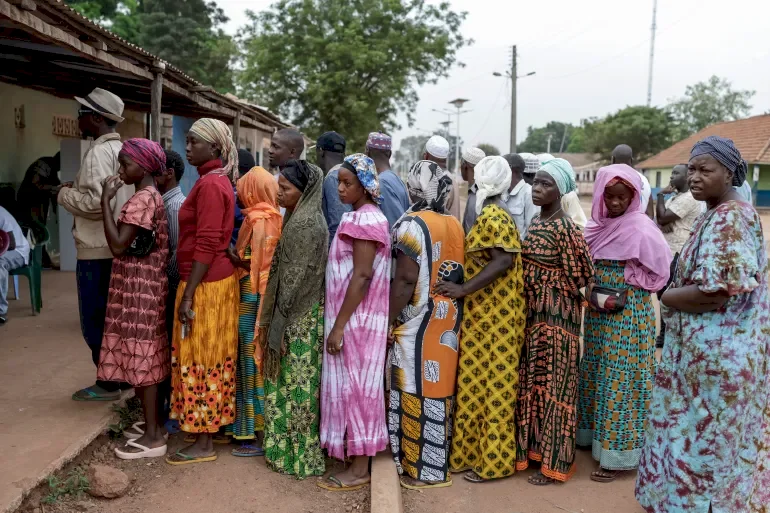
Guinea: Presidential and Legislative Elections Kick Off Amidst Tense Political Atmosphere
SadaNews - Guinea-Bissau launched its presidential and legislative elections today, Sunday, amidst a tense political atmosphere and sharp polarization, as current President Umaro Sissoco Embaló seeks a second term, while facing strong competition from opposition candidate Fernando Dias and other challengers.
Almost one million registered voters are participating in the voting, constituting about half of the country’s population of approximately 2.25 million.
President Embaló faces 11 other candidates, the most notable being relatively new political entrant Fernando Dias, who enjoys the support of the leader of the Guinea-Bissau and Cape Verde Independence Party, which led the struggle for independence from Portugal in the 1960s and 1970s.
For the first time, the party was barred from submitting its candidates in the presidential and legislative elections after authorities claimed it submitted its documents late.
Analysts expect a close race between Embaló and Dias, and a second round of voting will be held if no candidate receives more than 50% of the votes.
Voters appeared deeply divided during recent rallies on Friday.
Highly Polarized Politics
The small country located on the coast between Senegal and Guinea has witnessed at least nine coups or coup attempts before Embaló took office.
Embaló claims to have survived three other attempts since then, although his opponents accuse him of fabricating crises to justify crackdowns, accusations he denies.
President Embaló has pledged to achieve stability, build more roads, and expand access to water if granted a second term.
Conversely, Dias promised to improve essential services, stating he would promote reconciliation and keep the military away from politics.
Embaló is also accused of planning to weaken Guinea-Bissau’s institutions to enhance presidential powers if re-elected.
Throughout the year, questions regarding Embaló's legitimacy have followed him, as his opponents claim his term ended in February.
Lucia de Lugo, director of the West Africa Illegal Economies Observatory, stated that "the current electoral climate is extremely tense, with a highly polarized political scene."
She added that "the opposition has substantial and long-standing popular support, but their campaign efforts have been severely constrained, and there is no level playing field as we approach the elections."
The observatory is part of the Global Initiative Against Transnational Organized Crime, which has tracked Guinea-Bissau's status as a key transit point for cocaine coming from South America to Europe.
Saiko Kande, a tailor, said, "I will vote for Umaro Sissoco Embaló to lead a campaign against corruption and drug trafficking."
He added that "Embaló will also find a solution to the security crisis, the food crisis, and of course the political crisis that Guinea-Bissau has been mired in for a long time."
Bertha da Guía, a businesswoman, expressed concern over Embaló's decision to dissolve parliament after his government claimed there was an attempted coup in late 2023.
She added, "I support Fernando Dias," pointing out that she expects him to receive strong support from the Balanta ethnic group, the largest in the country that has traditionally supported the Dias Social Renewal Party.
Source: Agencies

International Calls to De-escalate and Warnings of Serious Consequences After Strikes on I...

Syria: 4 Killed in Suwayda Due to Iranian Missile Strike

Moscow: The Attack on Iran is Dangerous and May Lead to Catastrophe

Closure of Airspace and Interception of Iranian Missiles in Gulf States

Lebanon Rejects Involvement in Regional Conflicts

Jordanian Army Announces the Downing of Two Ballistic Missiles Targeting the Kingdom

Two Explosions Rock Jalalabad in Eastern Afghanistan... Pakistan Denies Its Fighter Jet Cr...

